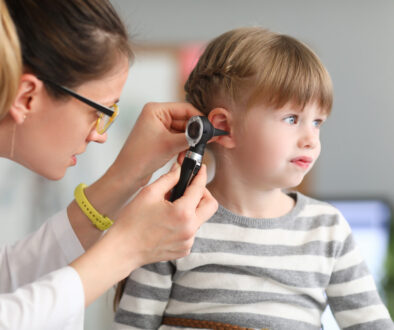Can Infants Take Allergy Medication?
Adults aren’t the only ones who suffer with sneezes and watery eyes during allergy season. In fact, roughly 8.4 percent of children are diagnosed each year with the symptoms known as “hay fever” (allergic rhinitis), according to the Allergy and Asthma Foundation of America.
Children frequently experience the same allergy problems as adults—many of our patients are children. However, there are several safety issues that must be considered before administering any type of allergy medicine to younger children, particularly to infants.
Allergy Help for Infants
Nasal saline is the safest and one of the most effective treatments for allergies.
Most over-the-counter (OTC) allergy meds are considered safe for kids 2 years of age and older. Oral antihistamines like Claritin (loratadine), Zyrtec (cetirizine), and Allegra (fexofenadine) are available OTC in kid-friendly formulations. These meds help with sneezing, itching, eye irritation, and runny nose.
In addition, Benadryl (diphenhydramine) is an OTC antihistamine that is safe for children to take.
Nasal steroid sprays like Flonase and Nasacort are approved for use in kids 2 years of age and older. Rhinocort is approved for kids 6 years of age and older. These meds help with nasal congestion and other allergy symptoms. These meds should be used with caution in kids, as some studies have shown a small risk of growth restriction.
Oral decongestants like Sudafed should not be used in kids younger than 12. Nasal decongestants like Afrin can be used with caution and sparingly in kids 6 and older.
If child is less than 2, consult one of our ENTs or a pediatrician. For kids between 2-6, schedule an appointment with one of our ENTs or a pediatrician if OTC meds are not working within 1-2 weeks.
Signs That Your Baby May Have Allergies
Allergic rhinitis typically does not develop until age 4-5. Asthma also often develops at this age. The most common manifestation of allergies in infants is eczema and food allergies, according to the American College of Allergy, Asthma and Immunology.
Allergies Are Likely Hereditary
Allergies have a significant hereditary component – if one parent has allergies/asthma, their child has a 25 percent chance of developing the same condition. If two parents have allergies/asthma, their child has a 50 percent chance.
How To Tell If Your Child Has Allergies
First, ask yourself if these symptoms appear at certain times of the year. This is often the first clue that your child’s problems are allergy-related.
The most common childhood allergy is allergic rhinitis, according to the American College of Allergy, Asthma and Immunology. Symptoms include:
- Postnasal drip
- Congestion
- Runny nose
- Sneezing
- Watery eyes
- Chronic ear problems or infections
Our experts at Raleigh Capitol ENT can help your child manage allergy symptoms
If your child or infant struggles with allergies, the best course of action is to schedule an appointment with us today. We specialize in helping pediatric patients, and we’ll be able to prescribe a course of treatment that is both safe and effective.
We would consider allergy testing and treating with SLIT around age 5 and above.
Most importantly, we want you to ask questions. We consider ourselves a partner in your care, and we want your children to have a healthy life with as few allergic discomforts as possible. We are here to answer any concerns you may have about treatment plans or ways you can help your child. Schedule an appointment with us today.
Raleigh Capitol Ear, Nose, and Throat is the area’s premiere physician-owned ENT practice with seven convenient locations throughout Wake County. Our board-certified physicians have extensive experience in treating both common and complex cases to help adults and children alike. For more information or to schedule an appointment, contact us.
The information in this article and the other articles on this website is for educational purposes only and is not intended as medical advice. If you have questions or concerns, please contact your healthcare provider.
Sources:
American College of Allergy, Asthma and Immunology. “Children and Allergies.” Online.
Asthma and Allergy Foundation of America. “Allergy Facts.” Online.
Food and Drug Administration. “For Consumers: Updates.” Online.




